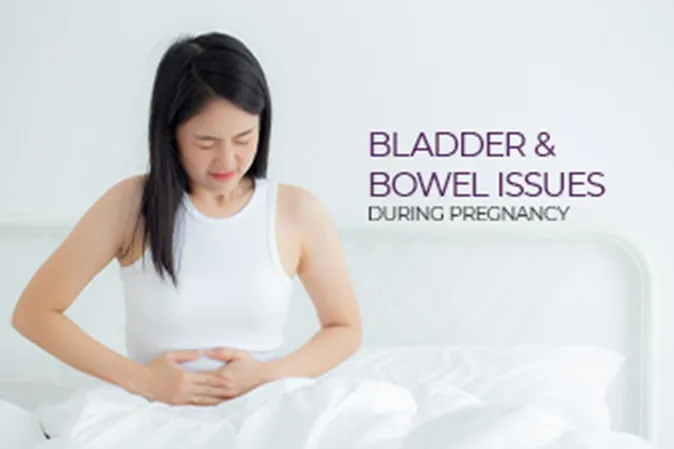Pregnant and always looking for a washroom when you step out? Not able to hold the urge to pee? Eating at home but always anxious about being constipated or having Irritable Bowel Syndrome (IBS)? You are not alone, nor are you strange for having these issues. All you need to do is understand your condition so that you can manage it better.
Constipation:
The hormonal changes you are going through often affect your digestion, and passing stools is uncomfortable and difficult.
Recognizing the symptoms of constipation during pregnancy is crucial for timely intervention. Common signs of constipation in expectant mothers include:
- Infrequent bowel movements (less than three times a week)
- Straining during bowel movements
- Hard or lumpy stools
- A feeling of incomplete evacuation
- Abdominal discomfort or pain
- Bloating and gas
- Rectal bleeding or haemorrhoids (due to excessive straining)
What to do: Speak to your nutritionist to tweak your diet plan so that it improves your digestion as well as eases your motions
What not to do: Ignore the symptoms or stop enjoying your meals for fear of dealing with the condition each time you go to poop.
READ: What is Baby Constipation ?
Frequent urge to pee:
Once you conceive, you might find yourself using the washroom frequently, to empty the bladder. This might continue through the pregnancy, as the baby in the womb may be resting on or pressing against the bladder.
What to do: Use the washroom before stepping out. If you are commuting for a longer time or travelling, locate a public washroom beforehand that is clean and hygienic, or stop at a cafe or mall, where you can ease yourself.
What not to do: Trying to constantly hold your bladder, and bearing the discomfort.
Incontinence:
In several cases, women are unable to hold the bladder at all, and a few drops leak out if they cough, sneeze, laugh or even get up with a slight jerk. Though it feels awkward and embarrassing, it is only because the pelvic floor muscles have started to relax to prepare for delivery.
Incontinence may continue until sometime after delivery, till the muscles return to their original firmness.
What to do: Speak to your doctor to ask for pelvic floor exercises that can help. You can also consider wearing a sanitary napkin or period underwear, to avoid becoming awkward when you step out. Wear darker colours so that it doesn’t show easily
What not to do: Stop going out for fear of embarrassment.
READ: What Are The Benefits Of Diet During Pregnancy
Haemorrhoids:
Haemorrhoids or piles, are enlarged swollen veins in and around the rectum and anus. It can happen to anyone (not just pregnant women), and can result in feeling itchy, painful or bleeding while passing stools.
During pregnancy, it may be due to constipation and/ or pressure due to the growing baby and uterus.
What to do: Consult a specialist, who will prescribe pregnancy-safe medication and changes in your diet.
What not to do: Eating too little in order to avoid having to pass stools regularly.
No matter what you’re going through, remember that lakhs of women have faced similar situations and gone through the same emotions and concerns. Always keep your doctor updated, and take into confidence someone from your family.
Don’t forget that balanced and nutritious home-cooked meals, coupled with recommended exercises and walking, can go a long way in making your pregnancy comfortable and relaxed.

